Reflective Diary: Effective Communication in Health and Social Care
VerifiedAdded on 2020/01/23
|14
|4566
|59
Report
AI Summary
This reflective diary assignment analyzes the significance of effective communication in health and social care organizations. The author discusses the importance of communication between employees, service providers, and users, highlighting the need to avoid communication barriers and the advantages of strong communication skills. The diary explores theoretical frameworks underpinning communication, including Aristotle's and Poole's communication theories, outlining the key elements of each. It then examines how communication skills are effectively used with service users, colleagues, and peers, detailing the roles of managers and employees in fostering effective communication. The author emphasizes the importance of managers understanding situations, focusing on problems, and holding face-to-face meetings, while employees should maintain understanding attitudes and learn from mistakes to improve communication. The assignment provides a comprehensive overview of communication strategies and their impact on healthcare settings.

University
ASSIGNMENT TITLE: REFLECTIVE DIARY
Name
Lecturer’s name
ASSIGNMENT TITLE: REFLECTIVE DIARY
Name
Lecturer’s name
Paraphrase This Document
Need a fresh take? Get an instant paraphrase of this document with our AI Paraphraser
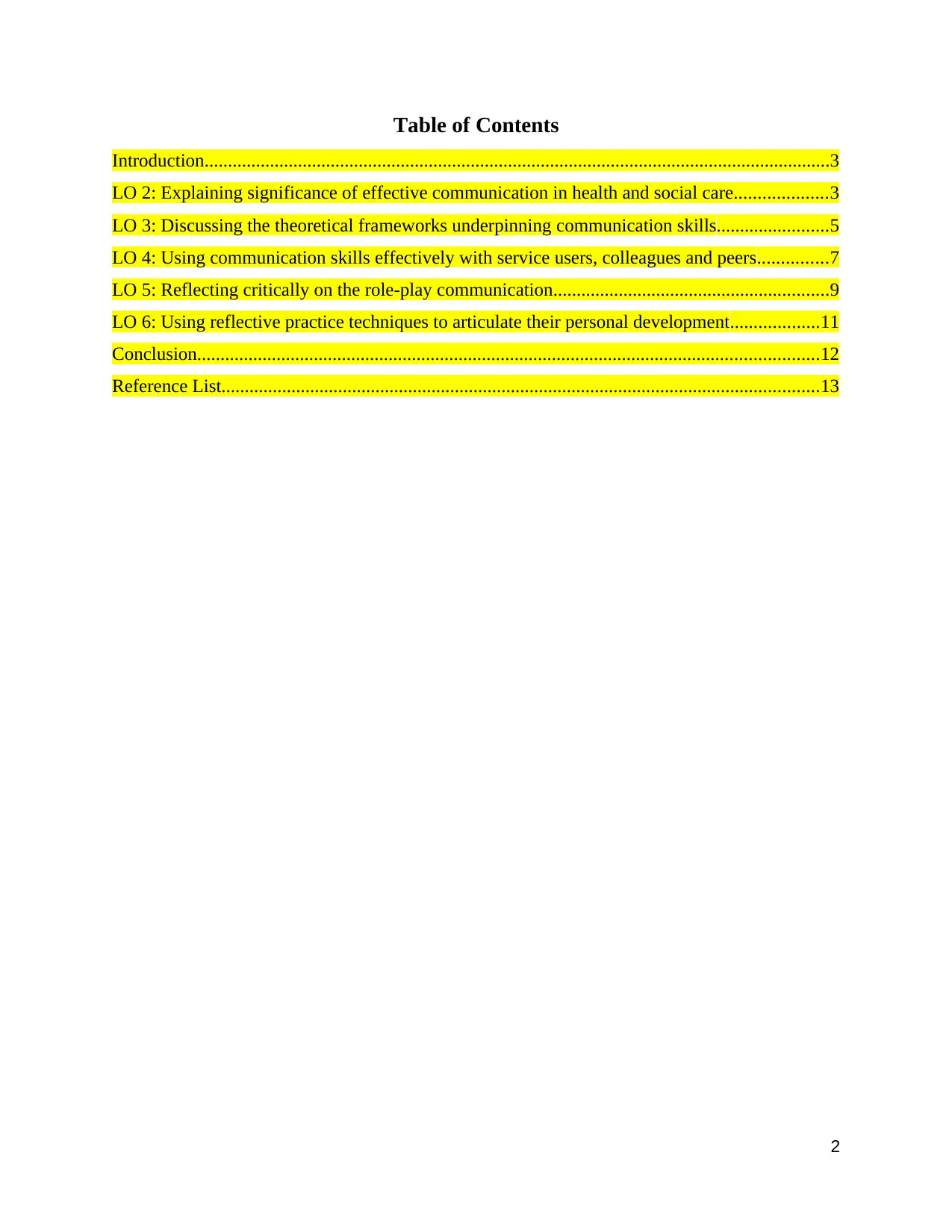
Table of Contents
Introduction......................................................................................................................................3
LO 2: Explaining significance of effective communication in health and social care....................3
LO 3: Discussing the theoretical frameworks underpinning communication skills........................5
LO 4: Using communication skills effectively with service users, colleagues and peers...............7
LO 5: Reflecting critically on the role-play communication...........................................................9
LO 6: Using reflective practice techniques to articulate their personal development...................11
Conclusion.....................................................................................................................................12
Reference List................................................................................................................................13
2
Introduction......................................................................................................................................3
LO 2: Explaining significance of effective communication in health and social care....................3
LO 3: Discussing the theoretical frameworks underpinning communication skills........................5
LO 4: Using communication skills effectively with service users, colleagues and peers...............7
LO 5: Reflecting critically on the role-play communication...........................................................9
LO 6: Using reflective practice techniques to articulate their personal development...................11
Conclusion.....................................................................................................................................12
Reference List................................................................................................................................13
2
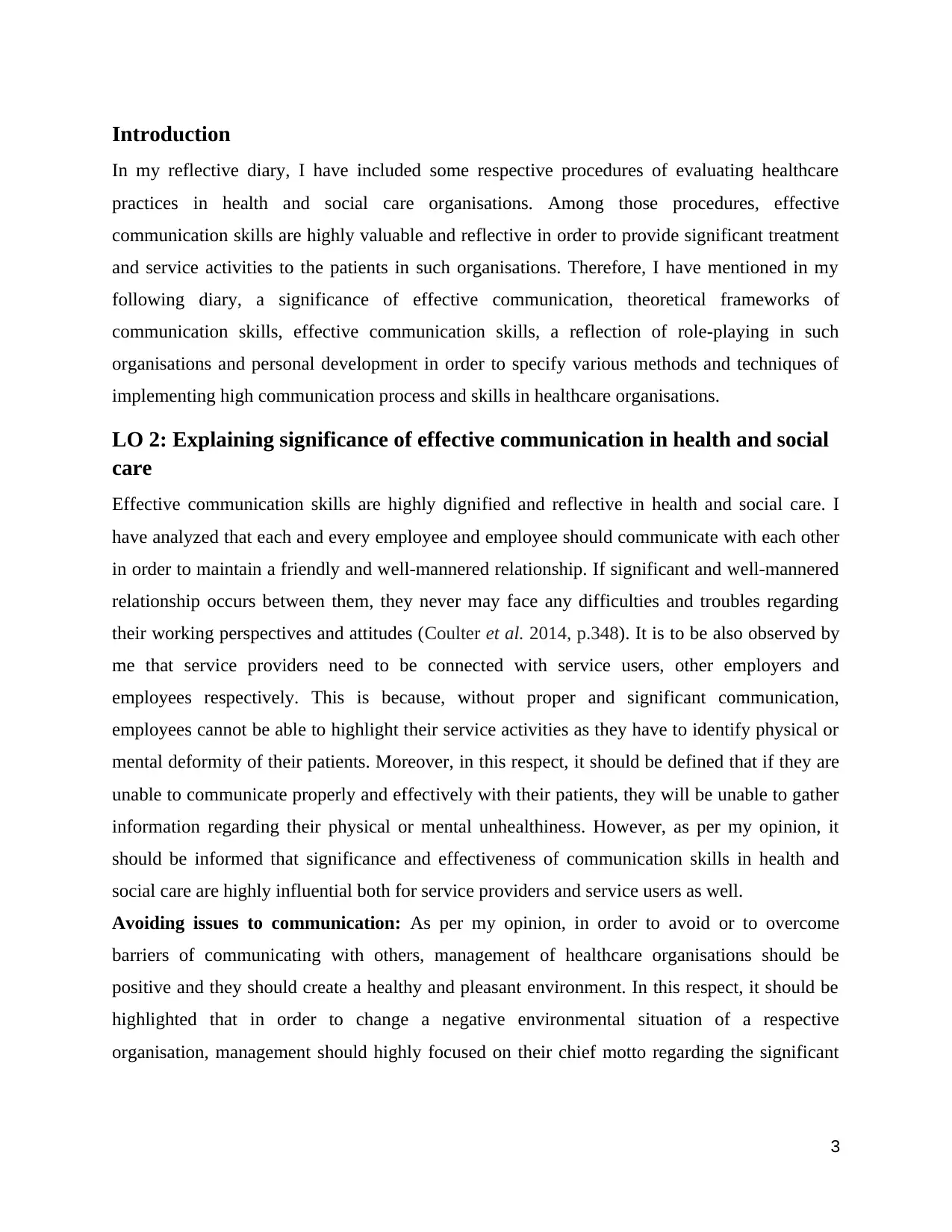
Introduction
In my reflective diary, I have included some respective procedures of evaluating healthcare
practices in health and social care organisations. Among those procedures, effective
communication skills are highly valuable and reflective in order to provide significant treatment
and service activities to the patients in such organisations. Therefore, I have mentioned in my
following diary, a significance of effective communication, theoretical frameworks of
communication skills, effective communication skills, a reflection of role-playing in such
organisations and personal development in order to specify various methods and techniques of
implementing high communication process and skills in healthcare organisations.
LO 2: Explaining significance of effective communication in health and social
care
Effective communication skills are highly dignified and reflective in health and social care. I
have analyzed that each and every employee and employee should communicate with each other
in order to maintain a friendly and well-mannered relationship. If significant and well-mannered
relationship occurs between them, they never may face any difficulties and troubles regarding
their working perspectives and attitudes (Coulter et al. 2014, p.348). It is to be also observed by
me that service providers need to be connected with service users, other employers and
employees respectively. This is because, without proper and significant communication,
employees cannot be able to highlight their service activities as they have to identify physical or
mental deformity of their patients. Moreover, in this respect, it should be defined that if they are
unable to communicate properly and effectively with their patients, they will be unable to gather
information regarding their physical or mental unhealthiness. However, as per my opinion, it
should be informed that significance and effectiveness of communication skills in health and
social care are highly influential both for service providers and service users as well.
Avoiding issues to communication: As per my opinion, in order to avoid or to overcome
barriers of communicating with others, management of healthcare organisations should be
positive and they should create a healthy and pleasant environment. In this respect, it should be
highlighted that in order to change a negative environmental situation of a respective
organisation, management should highly focused on their chief motto regarding the significant
3
In my reflective diary, I have included some respective procedures of evaluating healthcare
practices in health and social care organisations. Among those procedures, effective
communication skills are highly valuable and reflective in order to provide significant treatment
and service activities to the patients in such organisations. Therefore, I have mentioned in my
following diary, a significance of effective communication, theoretical frameworks of
communication skills, effective communication skills, a reflection of role-playing in such
organisations and personal development in order to specify various methods and techniques of
implementing high communication process and skills in healthcare organisations.
LO 2: Explaining significance of effective communication in health and social
care
Effective communication skills are highly dignified and reflective in health and social care. I
have analyzed that each and every employee and employee should communicate with each other
in order to maintain a friendly and well-mannered relationship. If significant and well-mannered
relationship occurs between them, they never may face any difficulties and troubles regarding
their working perspectives and attitudes (Coulter et al. 2014, p.348). It is to be also observed by
me that service providers need to be connected with service users, other employers and
employees respectively. This is because, without proper and significant communication,
employees cannot be able to highlight their service activities as they have to identify physical or
mental deformity of their patients. Moreover, in this respect, it should be defined that if they are
unable to communicate properly and effectively with their patients, they will be unable to gather
information regarding their physical or mental unhealthiness. However, as per my opinion, it
should be informed that significance and effectiveness of communication skills in health and
social care are highly influential both for service providers and service users as well.
Avoiding issues to communication: As per my opinion, in order to avoid or to overcome
barriers of communicating with others, management of healthcare organisations should be
positive and they should create a healthy and pleasant environment. In this respect, it should be
highlighted that in order to change a negative environmental situation of a respective
organisation, management should highly focused on their chief motto regarding the significant
3
⊘ This is a preview!⊘
Do you want full access?
Subscribe today to unlock all pages.

Trusted by 1+ million students worldwide
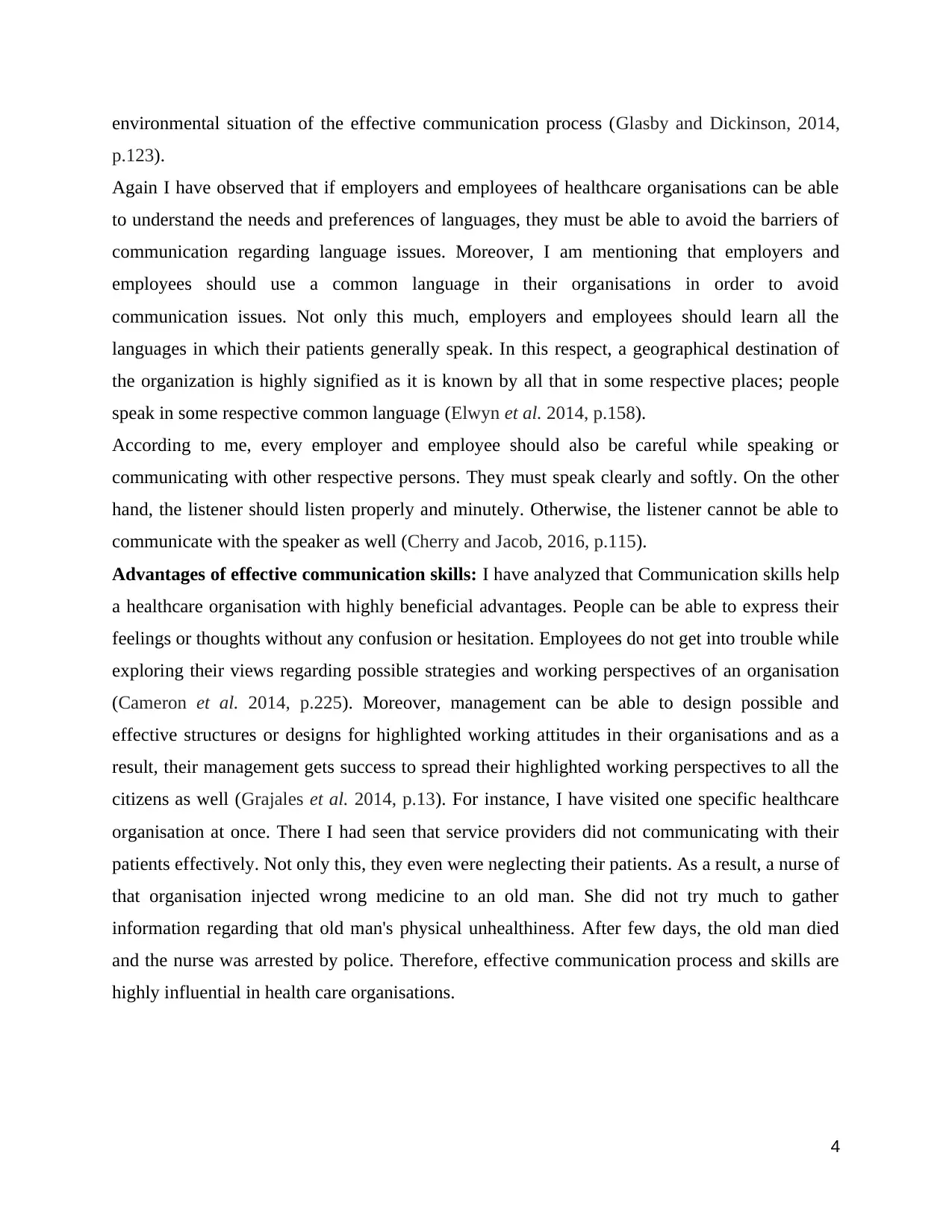
environmental situation of the effective communication process (Glasby and Dickinson, 2014,
p.123).
Again I have observed that if employers and employees of healthcare organisations can be able
to understand the needs and preferences of languages, they must be able to avoid the barriers of
communication regarding language issues. Moreover, I am mentioning that employers and
employees should use a common language in their organisations in order to avoid
communication issues. Not only this much, employers and employees should learn all the
languages in which their patients generally speak. In this respect, a geographical destination of
the organization is highly signified as it is known by all that in some respective places; people
speak in some respective common language (Elwyn et al. 2014, p.158).
According to me, every employer and employee should also be careful while speaking or
communicating with other respective persons. They must speak clearly and softly. On the other
hand, the listener should listen properly and minutely. Otherwise, the listener cannot be able to
communicate with the speaker as well (Cherry and Jacob, 2016, p.115).
Advantages of effective communication skills: I have analyzed that Communication skills help
a healthcare organisation with highly beneficial advantages. People can be able to express their
feelings or thoughts without any confusion or hesitation. Employees do not get into trouble while
exploring their views regarding possible strategies and working perspectives of an organisation
(Cameron et al. 2014, p.225). Moreover, management can be able to design possible and
effective structures or designs for highlighted working attitudes in their organisations and as a
result, their management gets success to spread their highlighted working perspectives to all the
citizens as well (Grajales et al. 2014, p.13). For instance, I have visited one specific healthcare
organisation at once. There I had seen that service providers did not communicating with their
patients effectively. Not only this, they even were neglecting their patients. As a result, a nurse of
that organisation injected wrong medicine to an old man. She did not try much to gather
information regarding that old man's physical unhealthiness. After few days, the old man died
and the nurse was arrested by police. Therefore, effective communication process and skills are
highly influential in health care organisations.
4
p.123).
Again I have observed that if employers and employees of healthcare organisations can be able
to understand the needs and preferences of languages, they must be able to avoid the barriers of
communication regarding language issues. Moreover, I am mentioning that employers and
employees should use a common language in their organisations in order to avoid
communication issues. Not only this much, employers and employees should learn all the
languages in which their patients generally speak. In this respect, a geographical destination of
the organization is highly signified as it is known by all that in some respective places; people
speak in some respective common language (Elwyn et al. 2014, p.158).
According to me, every employer and employee should also be careful while speaking or
communicating with other respective persons. They must speak clearly and softly. On the other
hand, the listener should listen properly and minutely. Otherwise, the listener cannot be able to
communicate with the speaker as well (Cherry and Jacob, 2016, p.115).
Advantages of effective communication skills: I have analyzed that Communication skills help
a healthcare organisation with highly beneficial advantages. People can be able to express their
feelings or thoughts without any confusion or hesitation. Employees do not get into trouble while
exploring their views regarding possible strategies and working perspectives of an organisation
(Cameron et al. 2014, p.225). Moreover, management can be able to design possible and
effective structures or designs for highlighted working attitudes in their organisations and as a
result, their management gets success to spread their highlighted working perspectives to all the
citizens as well (Grajales et al. 2014, p.13). For instance, I have visited one specific healthcare
organisation at once. There I had seen that service providers did not communicating with their
patients effectively. Not only this, they even were neglecting their patients. As a result, a nurse of
that organisation injected wrong medicine to an old man. She did not try much to gather
information regarding that old man's physical unhealthiness. After few days, the old man died
and the nurse was arrested by police. Therefore, effective communication process and skills are
highly influential in health care organisations.
4
Paraphrase This Document
Need a fresh take? Get an instant paraphrase of this document with our AI Paraphraser
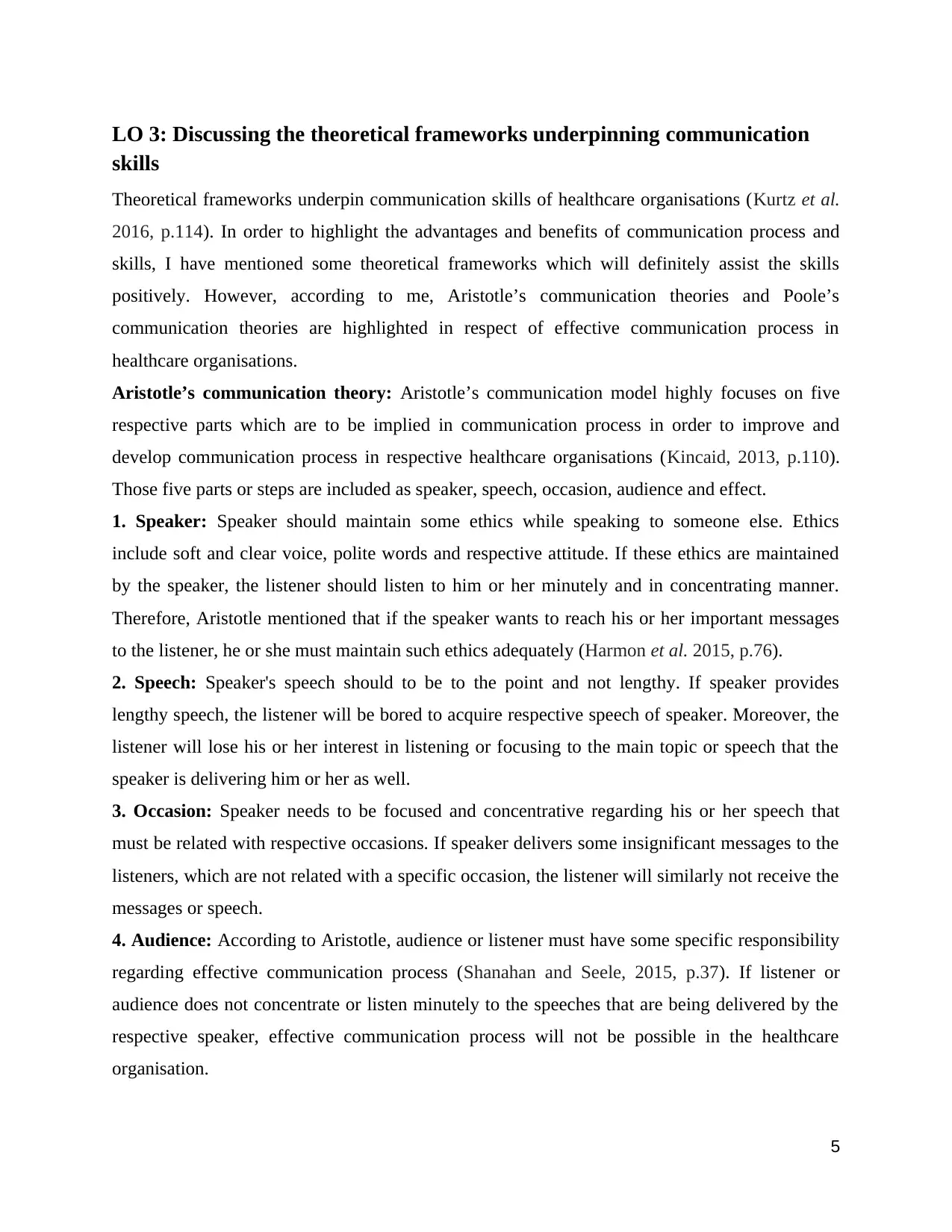
LO 3: Discussing the theoretical frameworks underpinning communication
skills
Theoretical frameworks underpin communication skills of healthcare organisations (Kurtz et al.
2016, p.114). In order to highlight the advantages and benefits of communication process and
skills, I have mentioned some theoretical frameworks which will definitely assist the skills
positively. However, according to me, Aristotle’s communication theories and Poole’s
communication theories are highlighted in respect of effective communication process in
healthcare organisations.
Aristotle’s communication theory: Aristotle’s communication model highly focuses on five
respective parts which are to be implied in communication process in order to improve and
develop communication process in respective healthcare organisations (Kincaid, 2013, p.110).
Those five parts or steps are included as speaker, speech, occasion, audience and effect.
1. Speaker: Speaker should maintain some ethics while speaking to someone else. Ethics
include soft and clear voice, polite words and respective attitude. If these ethics are maintained
by the speaker, the listener should listen to him or her minutely and in concentrating manner.
Therefore, Aristotle mentioned that if the speaker wants to reach his or her important messages
to the listener, he or she must maintain such ethics adequately (Harmon et al. 2015, p.76).
2. Speech: Speaker's speech should to be to the point and not lengthy. If speaker provides
lengthy speech, the listener will be bored to acquire respective speech of speaker. Moreover, the
listener will lose his or her interest in listening or focusing to the main topic or speech that the
speaker is delivering him or her as well.
3. Occasion: Speaker needs to be focused and concentrative regarding his or her speech that
must be related with respective occasions. If speaker delivers some insignificant messages to the
listeners, which are not related with a specific occasion, the listener will similarly not receive the
messages or speech.
4. Audience: According to Aristotle, audience or listener must have some specific responsibility
regarding effective communication process (Shanahan and Seele, 2015, p.37). If listener or
audience does not concentrate or listen minutely to the speeches that are being delivered by the
respective speaker, effective communication process will not be possible in the healthcare
organisation.
5
skills
Theoretical frameworks underpin communication skills of healthcare organisations (Kurtz et al.
2016, p.114). In order to highlight the advantages and benefits of communication process and
skills, I have mentioned some theoretical frameworks which will definitely assist the skills
positively. However, according to me, Aristotle’s communication theories and Poole’s
communication theories are highlighted in respect of effective communication process in
healthcare organisations.
Aristotle’s communication theory: Aristotle’s communication model highly focuses on five
respective parts which are to be implied in communication process in order to improve and
develop communication process in respective healthcare organisations (Kincaid, 2013, p.110).
Those five parts or steps are included as speaker, speech, occasion, audience and effect.
1. Speaker: Speaker should maintain some ethics while speaking to someone else. Ethics
include soft and clear voice, polite words and respective attitude. If these ethics are maintained
by the speaker, the listener should listen to him or her minutely and in concentrating manner.
Therefore, Aristotle mentioned that if the speaker wants to reach his or her important messages
to the listener, he or she must maintain such ethics adequately (Harmon et al. 2015, p.76).
2. Speech: Speaker's speech should to be to the point and not lengthy. If speaker provides
lengthy speech, the listener will be bored to acquire respective speech of speaker. Moreover, the
listener will lose his or her interest in listening or focusing to the main topic or speech that the
speaker is delivering him or her as well.
3. Occasion: Speaker needs to be focused and concentrative regarding his or her speech that
must be related with respective occasions. If speaker delivers some insignificant messages to the
listeners, which are not related with a specific occasion, the listener will similarly not receive the
messages or speech.
4. Audience: According to Aristotle, audience or listener must have some specific responsibility
regarding effective communication process (Shanahan and Seele, 2015, p.37). If listener or
audience does not concentrate or listen minutely to the speeches that are being delivered by the
respective speaker, effective communication process will not be possible in the healthcare
organisation.
5
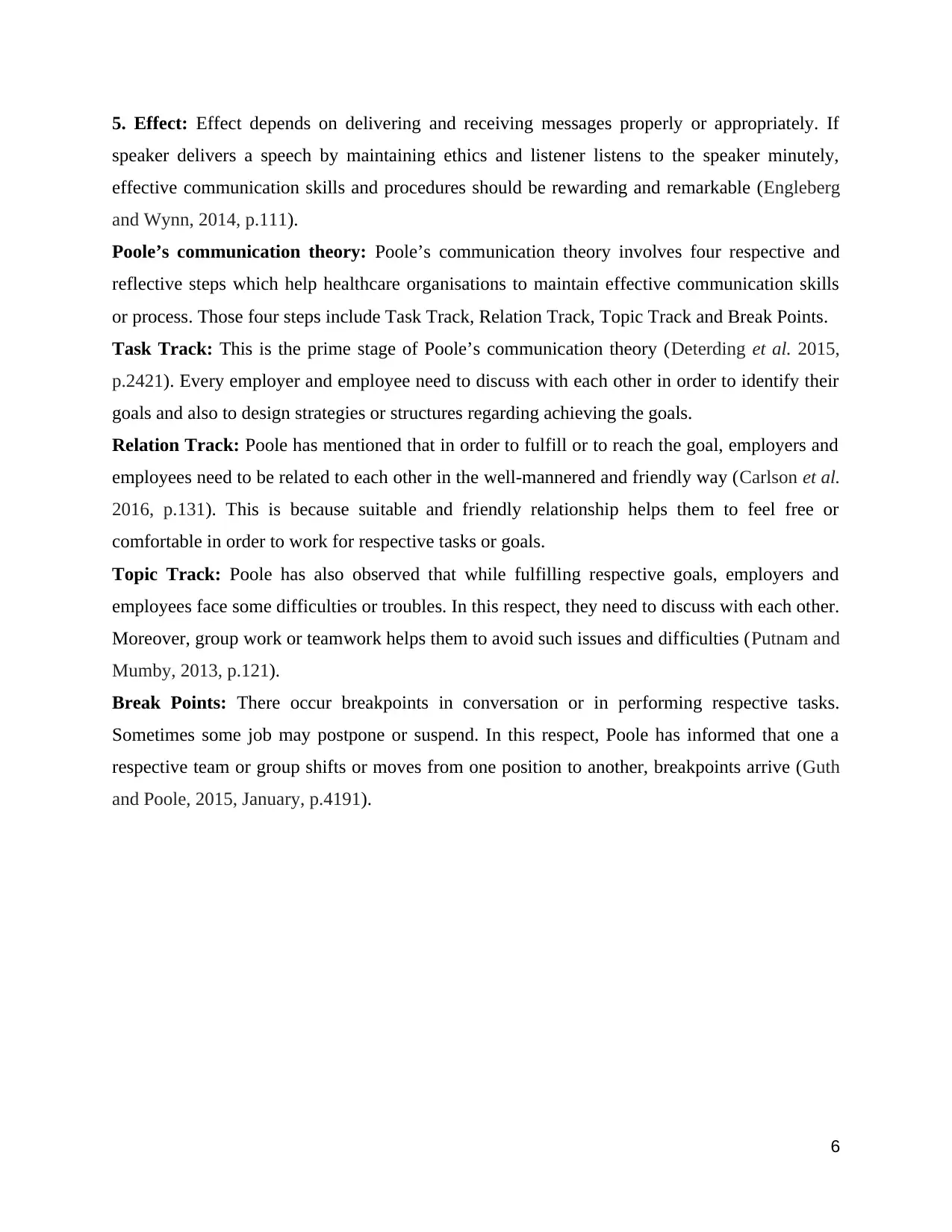
5. Effect: Effect depends on delivering and receiving messages properly or appropriately. If
speaker delivers a speech by maintaining ethics and listener listens to the speaker minutely,
effective communication skills and procedures should be rewarding and remarkable (Engleberg
and Wynn, 2014, p.111).
Poole’s communication theory: Poole’s communication theory involves four respective and
reflective steps which help healthcare organisations to maintain effective communication skills
or process. Those four steps include Task Track, Relation Track, Topic Track and Break Points.
Task Track: This is the prime stage of Poole’s communication theory (Deterding et al. 2015,
p.2421). Every employer and employee need to discuss with each other in order to identify their
goals and also to design strategies or structures regarding achieving the goals.
Relation Track: Poole has mentioned that in order to fulfill or to reach the goal, employers and
employees need to be related to each other in the well-mannered and friendly way (Carlson et al.
2016, p.131). This is because suitable and friendly relationship helps them to feel free or
comfortable in order to work for respective tasks or goals.
Topic Track: Poole has also observed that while fulfilling respective goals, employers and
employees face some difficulties or troubles. In this respect, they need to discuss with each other.
Moreover, group work or teamwork helps them to avoid such issues and difficulties (Putnam and
Mumby, 2013, p.121).
Break Points: There occur breakpoints in conversation or in performing respective tasks.
Sometimes some job may postpone or suspend. In this respect, Poole has informed that one a
respective team or group shifts or moves from one position to another, breakpoints arrive (Guth
and Poole, 2015, January, p.4191).
6
speaker delivers a speech by maintaining ethics and listener listens to the speaker minutely,
effective communication skills and procedures should be rewarding and remarkable (Engleberg
and Wynn, 2014, p.111).
Poole’s communication theory: Poole’s communication theory involves four respective and
reflective steps which help healthcare organisations to maintain effective communication skills
or process. Those four steps include Task Track, Relation Track, Topic Track and Break Points.
Task Track: This is the prime stage of Poole’s communication theory (Deterding et al. 2015,
p.2421). Every employer and employee need to discuss with each other in order to identify their
goals and also to design strategies or structures regarding achieving the goals.
Relation Track: Poole has mentioned that in order to fulfill or to reach the goal, employers and
employees need to be related to each other in the well-mannered and friendly way (Carlson et al.
2016, p.131). This is because suitable and friendly relationship helps them to feel free or
comfortable in order to work for respective tasks or goals.
Topic Track: Poole has also observed that while fulfilling respective goals, employers and
employees face some difficulties or troubles. In this respect, they need to discuss with each other.
Moreover, group work or teamwork helps them to avoid such issues and difficulties (Putnam and
Mumby, 2013, p.121).
Break Points: There occur breakpoints in conversation or in performing respective tasks.
Sometimes some job may postpone or suspend. In this respect, Poole has informed that one a
respective team or group shifts or moves from one position to another, breakpoints arrive (Guth
and Poole, 2015, January, p.4191).
6
⊘ This is a preview!⊘
Do you want full access?
Subscribe today to unlock all pages.

Trusted by 1+ million students worldwide
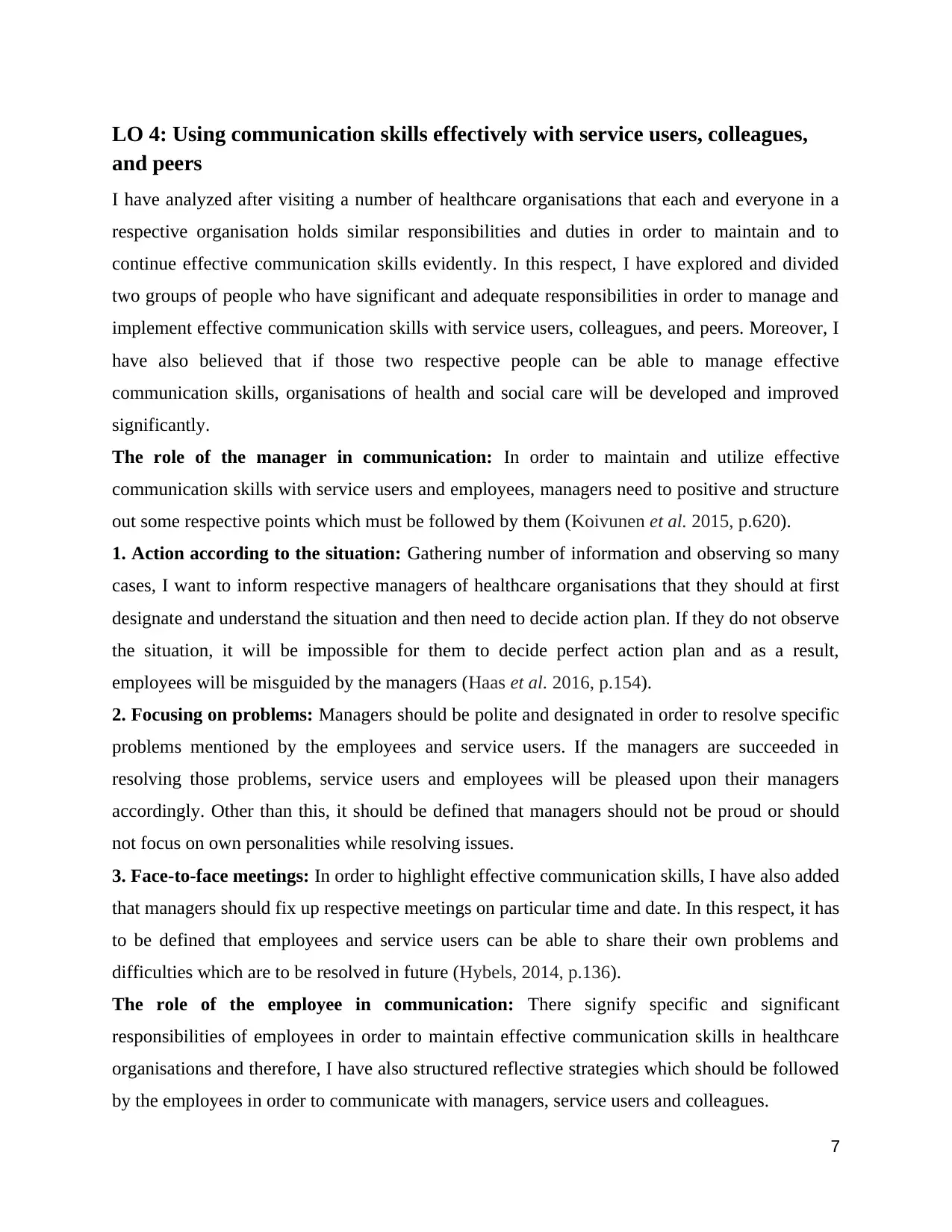
LO 4: Using communication skills effectively with service users, colleagues,
and peers
I have analyzed after visiting a number of healthcare organisations that each and everyone in a
respective organisation holds similar responsibilities and duties in order to maintain and to
continue effective communication skills evidently. In this respect, I have explored and divided
two groups of people who have significant and adequate responsibilities in order to manage and
implement effective communication skills with service users, colleagues, and peers. Moreover, I
have also believed that if those two respective people can be able to manage effective
communication skills, organisations of health and social care will be developed and improved
significantly.
The role of the manager in communication: In order to maintain and utilize effective
communication skills with service users and employees, managers need to positive and structure
out some respective points which must be followed by them (Koivunen et al. 2015, p.620).
1. Action according to the situation: Gathering number of information and observing so many
cases, I want to inform respective managers of healthcare organisations that they should at first
designate and understand the situation and then need to decide action plan. If they do not observe
the situation, it will be impossible for them to decide perfect action plan and as a result,
employees will be misguided by the managers (Haas et al. 2016, p.154).
2. Focusing on problems: Managers should be polite and designated in order to resolve specific
problems mentioned by the employees and service users. If the managers are succeeded in
resolving those problems, service users and employees will be pleased upon their managers
accordingly. Other than this, it should be defined that managers should not be proud or should
not focus on own personalities while resolving issues.
3. Face-to-face meetings: In order to highlight effective communication skills, I have also added
that managers should fix up respective meetings on particular time and date. In this respect, it has
to be defined that employees and service users can be able to share their own problems and
difficulties which are to be resolved in future (Hybels, 2014, p.136).
The role of the employee in communication: There signify specific and significant
responsibilities of employees in order to maintain effective communication skills in healthcare
organisations and therefore, I have also structured reflective strategies which should be followed
by the employees in order to communicate with managers, service users and colleagues.
7
and peers
I have analyzed after visiting a number of healthcare organisations that each and everyone in a
respective organisation holds similar responsibilities and duties in order to maintain and to
continue effective communication skills evidently. In this respect, I have explored and divided
two groups of people who have significant and adequate responsibilities in order to manage and
implement effective communication skills with service users, colleagues, and peers. Moreover, I
have also believed that if those two respective people can be able to manage effective
communication skills, organisations of health and social care will be developed and improved
significantly.
The role of the manager in communication: In order to maintain and utilize effective
communication skills with service users and employees, managers need to positive and structure
out some respective points which must be followed by them (Koivunen et al. 2015, p.620).
1. Action according to the situation: Gathering number of information and observing so many
cases, I want to inform respective managers of healthcare organisations that they should at first
designate and understand the situation and then need to decide action plan. If they do not observe
the situation, it will be impossible for them to decide perfect action plan and as a result,
employees will be misguided by the managers (Haas et al. 2016, p.154).
2. Focusing on problems: Managers should be polite and designated in order to resolve specific
problems mentioned by the employees and service users. If the managers are succeeded in
resolving those problems, service users and employees will be pleased upon their managers
accordingly. Other than this, it should be defined that managers should not be proud or should
not focus on own personalities while resolving issues.
3. Face-to-face meetings: In order to highlight effective communication skills, I have also added
that managers should fix up respective meetings on particular time and date. In this respect, it has
to be defined that employees and service users can be able to share their own problems and
difficulties which are to be resolved in future (Hybels, 2014, p.136).
The role of the employee in communication: There signify specific and significant
responsibilities of employees in order to maintain effective communication skills in healthcare
organisations and therefore, I have also structured reflective strategies which should be followed
by the employees in order to communicate with managers, service users and colleagues.
7
Paraphrase This Document
Need a fresh take? Get an instant paraphrase of this document with our AI Paraphraser
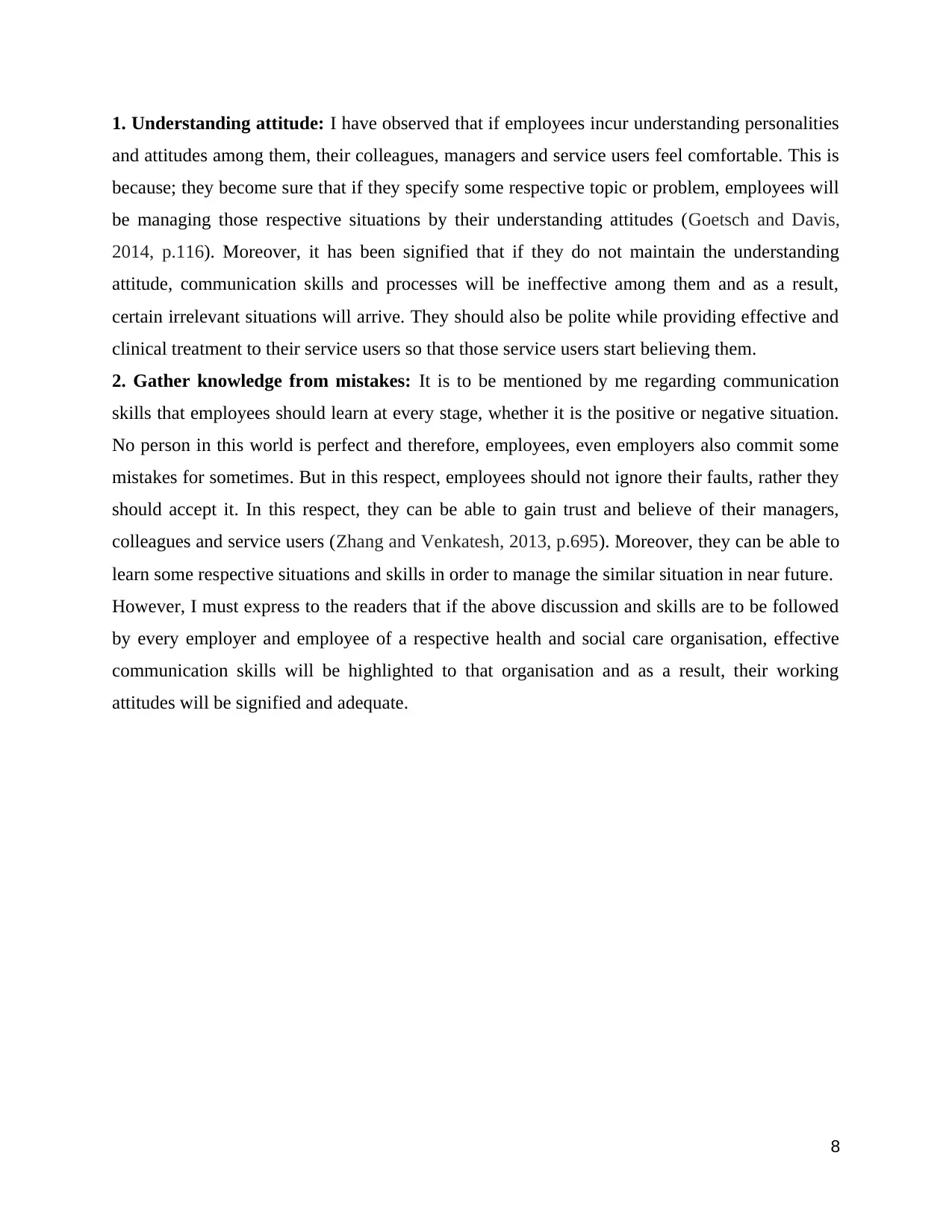
1. Understanding attitude: I have observed that if employees incur understanding personalities
and attitudes among them, their colleagues, managers and service users feel comfortable. This is
because; they become sure that if they specify some respective topic or problem, employees will
be managing those respective situations by their understanding attitudes (Goetsch and Davis,
2014, p.116). Moreover, it has been signified that if they do not maintain the understanding
attitude, communication skills and processes will be ineffective among them and as a result,
certain irrelevant situations will arrive. They should also be polite while providing effective and
clinical treatment to their service users so that those service users start believing them.
2. Gather knowledge from mistakes: It is to be mentioned by me regarding communication
skills that employees should learn at every stage, whether it is the positive or negative situation.
No person in this world is perfect and therefore, employees, even employers also commit some
mistakes for sometimes. But in this respect, employees should not ignore their faults, rather they
should accept it. In this respect, they can be able to gain trust and believe of their managers,
colleagues and service users (Zhang and Venkatesh, 2013, p.695). Moreover, they can be able to
learn some respective situations and skills in order to manage the similar situation in near future.
However, I must express to the readers that if the above discussion and skills are to be followed
by every employer and employee of a respective health and social care organisation, effective
communication skills will be highlighted to that organisation and as a result, their working
attitudes will be signified and adequate.
8
and attitudes among them, their colleagues, managers and service users feel comfortable. This is
because; they become sure that if they specify some respective topic or problem, employees will
be managing those respective situations by their understanding attitudes (Goetsch and Davis,
2014, p.116). Moreover, it has been signified that if they do not maintain the understanding
attitude, communication skills and processes will be ineffective among them and as a result,
certain irrelevant situations will arrive. They should also be polite while providing effective and
clinical treatment to their service users so that those service users start believing them.
2. Gather knowledge from mistakes: It is to be mentioned by me regarding communication
skills that employees should learn at every stage, whether it is the positive or negative situation.
No person in this world is perfect and therefore, employees, even employers also commit some
mistakes for sometimes. But in this respect, employees should not ignore their faults, rather they
should accept it. In this respect, they can be able to gain trust and believe of their managers,
colleagues and service users (Zhang and Venkatesh, 2013, p.695). Moreover, they can be able to
learn some respective situations and skills in order to manage the similar situation in near future.
However, I must express to the readers that if the above discussion and skills are to be followed
by every employer and employee of a respective health and social care organisation, effective
communication skills will be highlighted to that organisation and as a result, their working
attitudes will be signified and adequate.
8
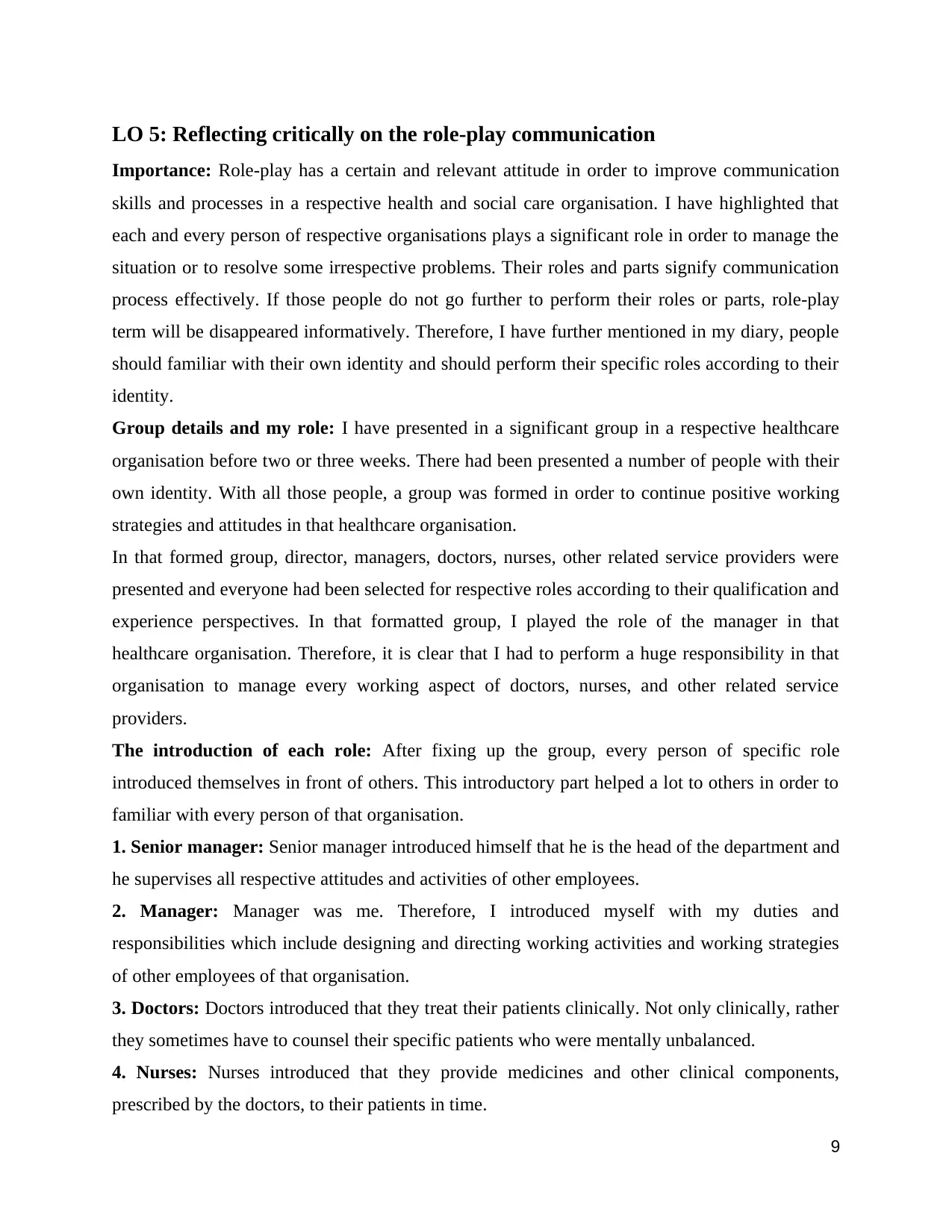
LO 5: Reflecting critically on the role-play communication
Importance: Role-play has a certain and relevant attitude in order to improve communication
skills and processes in a respective health and social care organisation. I have highlighted that
each and every person of respective organisations plays a significant role in order to manage the
situation or to resolve some irrespective problems. Their roles and parts signify communication
process effectively. If those people do not go further to perform their roles or parts, role-play
term will be disappeared informatively. Therefore, I have further mentioned in my diary, people
should familiar with their own identity and should perform their specific roles according to their
identity.
Group details and my role: I have presented in a significant group in a respective healthcare
organisation before two or three weeks. There had been presented a number of people with their
own identity. With all those people, a group was formed in order to continue positive working
strategies and attitudes in that healthcare organisation.
In that formed group, director, managers, doctors, nurses, other related service providers were
presented and everyone had been selected for respective roles according to their qualification and
experience perspectives. In that formatted group, I played the role of the manager in that
healthcare organisation. Therefore, it is clear that I had to perform a huge responsibility in that
organisation to manage every working aspect of doctors, nurses, and other related service
providers.
The introduction of each role: After fixing up the group, every person of specific role
introduced themselves in front of others. This introductory part helped a lot to others in order to
familiar with every person of that organisation.
1. Senior manager: Senior manager introduced himself that he is the head of the department and
he supervises all respective attitudes and activities of other employees.
2. Manager: Manager was me. Therefore, I introduced myself with my duties and
responsibilities which include designing and directing working activities and working strategies
of other employees of that organisation.
3. Doctors: Doctors introduced that they treat their patients clinically. Not only clinically, rather
they sometimes have to counsel their specific patients who were mentally unbalanced.
4. Nurses: Nurses introduced that they provide medicines and other clinical components,
prescribed by the doctors, to their patients in time.
9
Importance: Role-play has a certain and relevant attitude in order to improve communication
skills and processes in a respective health and social care organisation. I have highlighted that
each and every person of respective organisations plays a significant role in order to manage the
situation or to resolve some irrespective problems. Their roles and parts signify communication
process effectively. If those people do not go further to perform their roles or parts, role-play
term will be disappeared informatively. Therefore, I have further mentioned in my diary, people
should familiar with their own identity and should perform their specific roles according to their
identity.
Group details and my role: I have presented in a significant group in a respective healthcare
organisation before two or three weeks. There had been presented a number of people with their
own identity. With all those people, a group was formed in order to continue positive working
strategies and attitudes in that healthcare organisation.
In that formed group, director, managers, doctors, nurses, other related service providers were
presented and everyone had been selected for respective roles according to their qualification and
experience perspectives. In that formatted group, I played the role of the manager in that
healthcare organisation. Therefore, it is clear that I had to perform a huge responsibility in that
organisation to manage every working aspect of doctors, nurses, and other related service
providers.
The introduction of each role: After fixing up the group, every person of specific role
introduced themselves in front of others. This introductory part helped a lot to others in order to
familiar with every person of that organisation.
1. Senior manager: Senior manager introduced himself that he is the head of the department and
he supervises all respective attitudes and activities of other employees.
2. Manager: Manager was me. Therefore, I introduced myself with my duties and
responsibilities which include designing and directing working activities and working strategies
of other employees of that organisation.
3. Doctors: Doctors introduced that they treat their patients clinically. Not only clinically, rather
they sometimes have to counsel their specific patients who were mentally unbalanced.
4. Nurses: Nurses introduced that they provide medicines and other clinical components,
prescribed by the doctors, to their patients in time.
9
⊘ This is a preview!⊘
Do you want full access?
Subscribe today to unlock all pages.

Trusted by 1+ million students worldwide
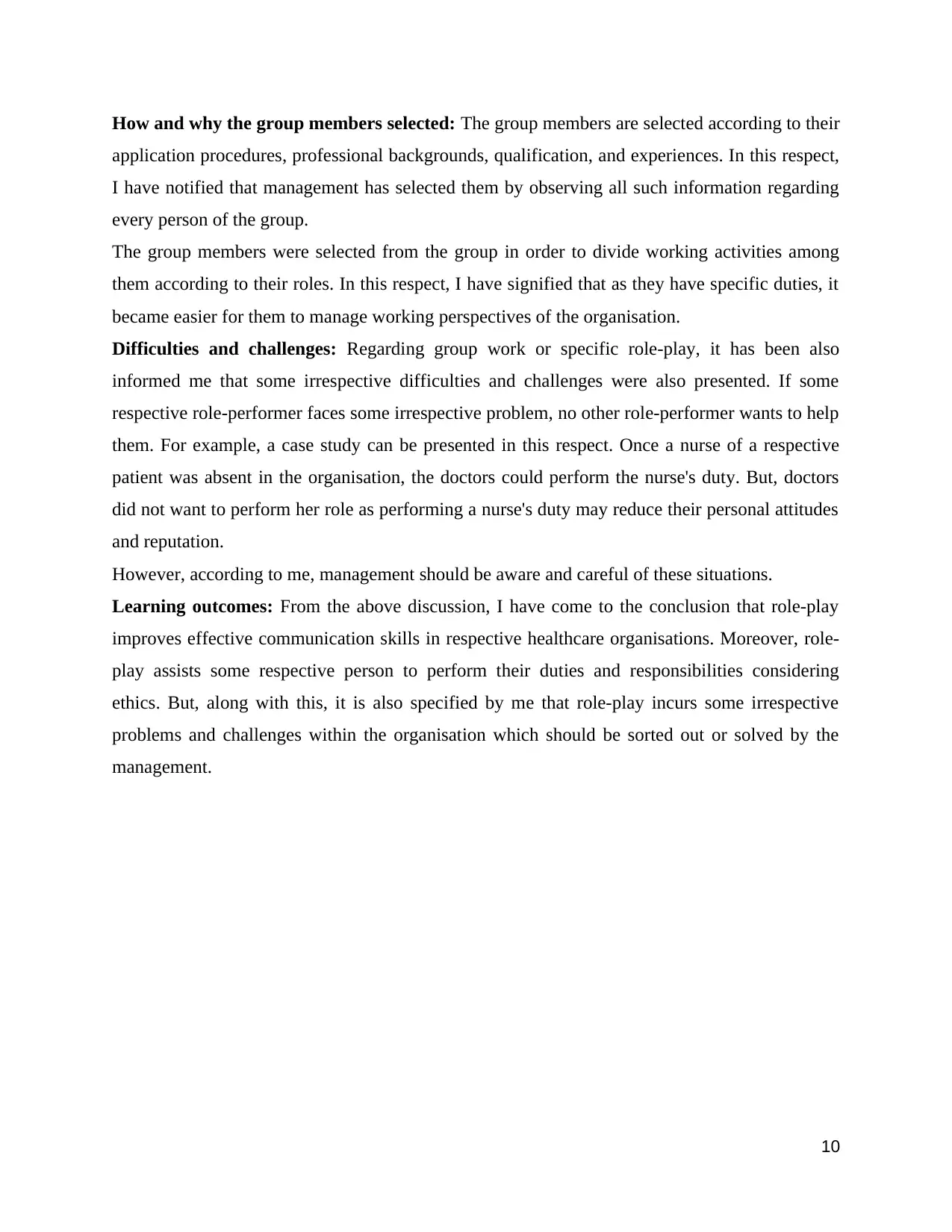
How and why the group members selected: The group members are selected according to their
application procedures, professional backgrounds, qualification, and experiences. In this respect,
I have notified that management has selected them by observing all such information regarding
every person of the group.
The group members were selected from the group in order to divide working activities among
them according to their roles. In this respect, I have signified that as they have specific duties, it
became easier for them to manage working perspectives of the organisation.
Difficulties and challenges: Regarding group work or specific role-play, it has been also
informed me that some irrespective difficulties and challenges were also presented. If some
respective role-performer faces some irrespective problem, no other role-performer wants to help
them. For example, a case study can be presented in this respect. Once a nurse of a respective
patient was absent in the organisation, the doctors could perform the nurse's duty. But, doctors
did not want to perform her role as performing a nurse's duty may reduce their personal attitudes
and reputation.
However, according to me, management should be aware and careful of these situations.
Learning outcomes: From the above discussion, I have come to the conclusion that role-play
improves effective communication skills in respective healthcare organisations. Moreover, role-
play assists some respective person to perform their duties and responsibilities considering
ethics. But, along with this, it is also specified by me that role-play incurs some irrespective
problems and challenges within the organisation which should be sorted out or solved by the
management.
10
application procedures, professional backgrounds, qualification, and experiences. In this respect,
I have notified that management has selected them by observing all such information regarding
every person of the group.
The group members were selected from the group in order to divide working activities among
them according to their roles. In this respect, I have signified that as they have specific duties, it
became easier for them to manage working perspectives of the organisation.
Difficulties and challenges: Regarding group work or specific role-play, it has been also
informed me that some irrespective difficulties and challenges were also presented. If some
respective role-performer faces some irrespective problem, no other role-performer wants to help
them. For example, a case study can be presented in this respect. Once a nurse of a respective
patient was absent in the organisation, the doctors could perform the nurse's duty. But, doctors
did not want to perform her role as performing a nurse's duty may reduce their personal attitudes
and reputation.
However, according to me, management should be aware and careful of these situations.
Learning outcomes: From the above discussion, I have come to the conclusion that role-play
improves effective communication skills in respective healthcare organisations. Moreover, role-
play assists some respective person to perform their duties and responsibilities considering
ethics. But, along with this, it is also specified by me that role-play incurs some irrespective
problems and challenges within the organisation which should be sorted out or solved by the
management.
10
Paraphrase This Document
Need a fresh take? Get an instant paraphrase of this document with our AI Paraphraser
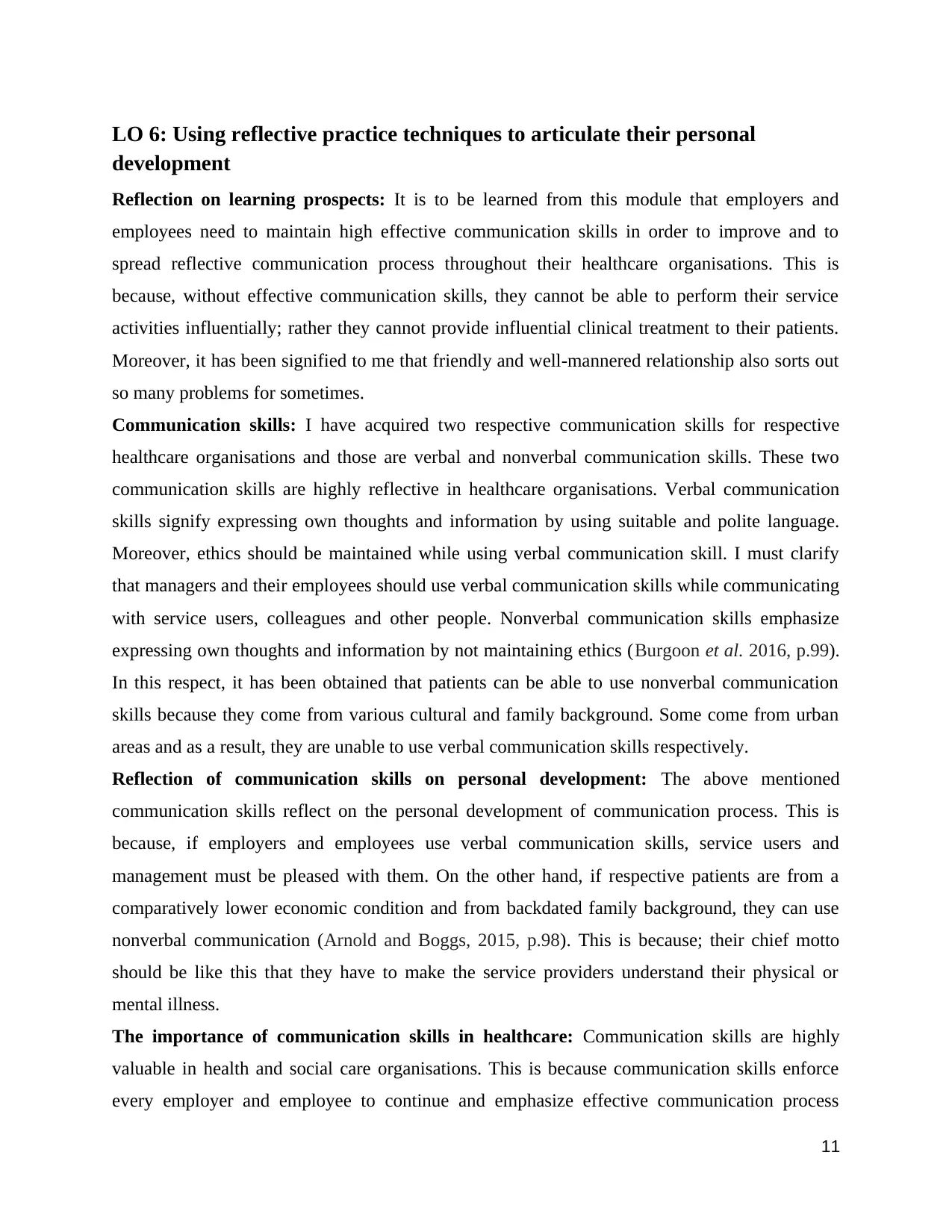
LO 6: Using reflective practice techniques to articulate their personal
development
Reflection on learning prospects: It is to be learned from this module that employers and
employees need to maintain high effective communication skills in order to improve and to
spread reflective communication process throughout their healthcare organisations. This is
because, without effective communication skills, they cannot be able to perform their service
activities influentially; rather they cannot provide influential clinical treatment to their patients.
Moreover, it has been signified to me that friendly and well-mannered relationship also sorts out
so many problems for sometimes.
Communication skills: I have acquired two respective communication skills for respective
healthcare organisations and those are verbal and nonverbal communication skills. These two
communication skills are highly reflective in healthcare organisations. Verbal communication
skills signify expressing own thoughts and information by using suitable and polite language.
Moreover, ethics should be maintained while using verbal communication skill. I must clarify
that managers and their employees should use verbal communication skills while communicating
with service users, colleagues and other people. Nonverbal communication skills emphasize
expressing own thoughts and information by not maintaining ethics (Burgoon et al. 2016, p.99).
In this respect, it has been obtained that patients can be able to use nonverbal communication
skills because they come from various cultural and family background. Some come from urban
areas and as a result, they are unable to use verbal communication skills respectively.
Reflection of communication skills on personal development: The above mentioned
communication skills reflect on the personal development of communication process. This is
because, if employers and employees use verbal communication skills, service users and
management must be pleased with them. On the other hand, if respective patients are from a
comparatively lower economic condition and from backdated family background, they can use
nonverbal communication (Arnold and Boggs, 2015, p.98). This is because; their chief motto
should be like this that they have to make the service providers understand their physical or
mental illness.
The importance of communication skills in healthcare: Communication skills are highly
valuable in health and social care organisations. This is because communication skills enforce
every employer and employee to continue and emphasize effective communication process
11
development
Reflection on learning prospects: It is to be learned from this module that employers and
employees need to maintain high effective communication skills in order to improve and to
spread reflective communication process throughout their healthcare organisations. This is
because, without effective communication skills, they cannot be able to perform their service
activities influentially; rather they cannot provide influential clinical treatment to their patients.
Moreover, it has been signified to me that friendly and well-mannered relationship also sorts out
so many problems for sometimes.
Communication skills: I have acquired two respective communication skills for respective
healthcare organisations and those are verbal and nonverbal communication skills. These two
communication skills are highly reflective in healthcare organisations. Verbal communication
skills signify expressing own thoughts and information by using suitable and polite language.
Moreover, ethics should be maintained while using verbal communication skill. I must clarify
that managers and their employees should use verbal communication skills while communicating
with service users, colleagues and other people. Nonverbal communication skills emphasize
expressing own thoughts and information by not maintaining ethics (Burgoon et al. 2016, p.99).
In this respect, it has been obtained that patients can be able to use nonverbal communication
skills because they come from various cultural and family background. Some come from urban
areas and as a result, they are unable to use verbal communication skills respectively.
Reflection of communication skills on personal development: The above mentioned
communication skills reflect on the personal development of communication process. This is
because, if employers and employees use verbal communication skills, service users and
management must be pleased with them. On the other hand, if respective patients are from a
comparatively lower economic condition and from backdated family background, they can use
nonverbal communication (Arnold and Boggs, 2015, p.98). This is because; their chief motto
should be like this that they have to make the service providers understand their physical or
mental illness.
The importance of communication skills in healthcare: Communication skills are highly
valuable in health and social care organisations. This is because communication skills enforce
every employer and employee to continue and emphasize effective communication process
11
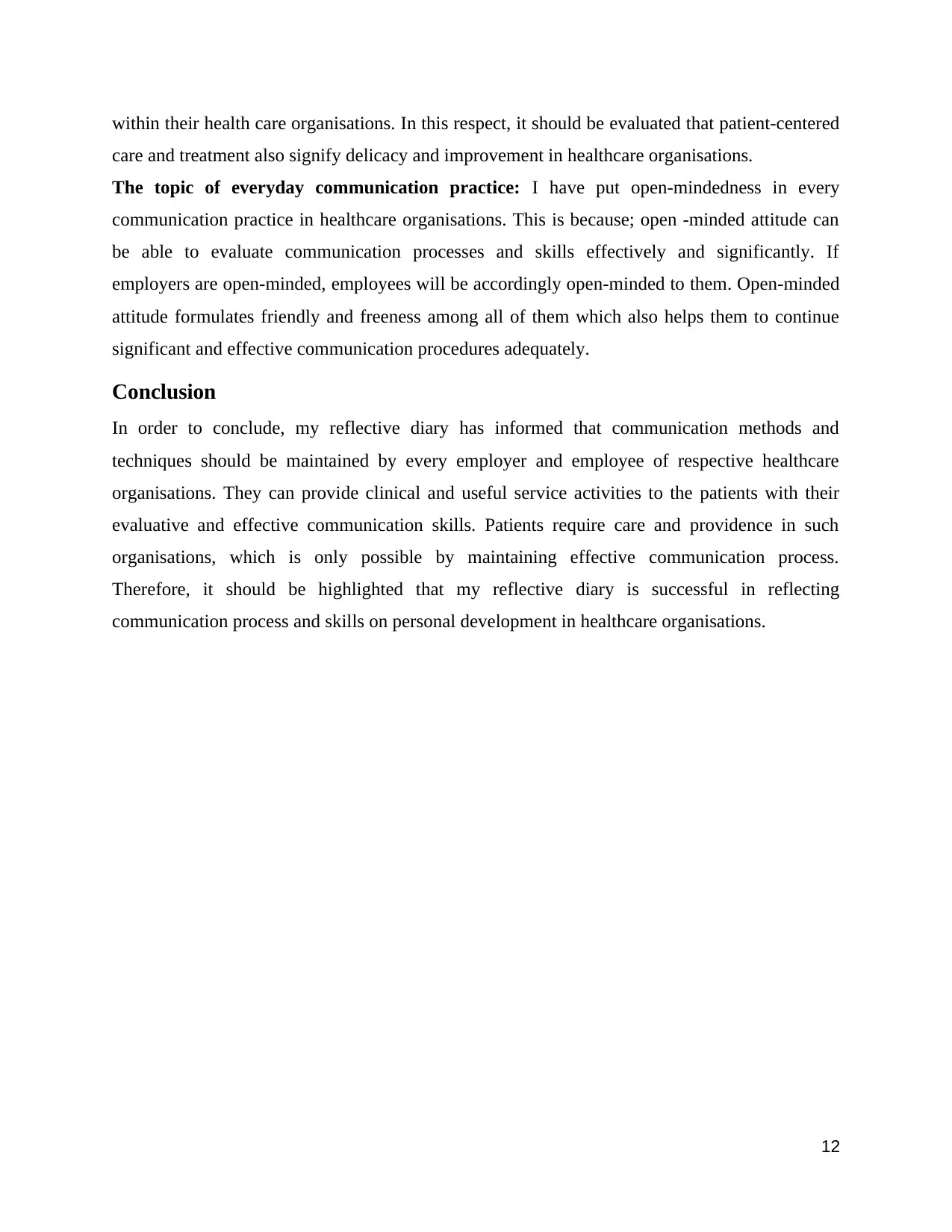
within their health care organisations. In this respect, it should be evaluated that patient-centered
care and treatment also signify delicacy and improvement in healthcare organisations.
The topic of everyday communication practice: I have put open-mindedness in every
communication practice in healthcare organisations. This is because; open -minded attitude can
be able to evaluate communication processes and skills effectively and significantly. If
employers are open-minded, employees will be accordingly open-minded to them. Open-minded
attitude formulates friendly and freeness among all of them which also helps them to continue
significant and effective communication procedures adequately.
Conclusion
In order to conclude, my reflective diary has informed that communication methods and
techniques should be maintained by every employer and employee of respective healthcare
organisations. They can provide clinical and useful service activities to the patients with their
evaluative and effective communication skills. Patients require care and providence in such
organisations, which is only possible by maintaining effective communication process.
Therefore, it should be highlighted that my reflective diary is successful in reflecting
communication process and skills on personal development in healthcare organisations.
12
care and treatment also signify delicacy and improvement in healthcare organisations.
The topic of everyday communication practice: I have put open-mindedness in every
communication practice in healthcare organisations. This is because; open -minded attitude can
be able to evaluate communication processes and skills effectively and significantly. If
employers are open-minded, employees will be accordingly open-minded to them. Open-minded
attitude formulates friendly and freeness among all of them which also helps them to continue
significant and effective communication procedures adequately.
Conclusion
In order to conclude, my reflective diary has informed that communication methods and
techniques should be maintained by every employer and employee of respective healthcare
organisations. They can provide clinical and useful service activities to the patients with their
evaluative and effective communication skills. Patients require care and providence in such
organisations, which is only possible by maintaining effective communication process.
Therefore, it should be highlighted that my reflective diary is successful in reflecting
communication process and skills on personal development in healthcare organisations.
12
⊘ This is a preview!⊘
Do you want full access?
Subscribe today to unlock all pages.

Trusted by 1+ million students worldwide
1 out of 14
Related Documents
Your All-in-One AI-Powered Toolkit for Academic Success.
+13062052269
info@desklib.com
Available 24*7 on WhatsApp / Email
![[object Object]](/_next/static/media/star-bottom.7253800d.svg)
Unlock your academic potential
Copyright © 2020–2025 A2Z Services. All Rights Reserved. Developed and managed by ZUCOL.





